📞 714-965-1587 📫 contact@greenskillslab.com
Program Overview
Explore various projects focused on environmental awareness and education.
Explore New Horizons GreenSkillsLab Outdoor School uses a hands-on, experiential approach to science education that focuses on adventure, self-discovery, and environmental stewardship. Students explore coastal ecosystems, oaks, and redwood forests, and each evening activity ends with songs and stories around a campfire.
The curriculum aligns with the standards and focuses on three areas:
Nature Appreciation and Understanding
Collaboration and Teamwork
Citizenship and Empowerment
These themes are taught through a variety of activities and lessons.
Daytime activities include:
Explore tide pools and coastal ecosystems at Natural Bridges State Beach
Hike and learn in redwood and mixed Tan Oak/Madrone/Douglas Fir forests
Sing songs about decomposition, adaptation, and food chains
Nighttime activities include:
Town Hall meetings where students debate and vote on development issues
Students learn to dance with our live band!
Night Hikes where students hike at night and learn about astronomy
Sketch Night where students perform skits about the endangered species their cabin is named after
Each evening ends with a campfire where naturalists sing and tell stories
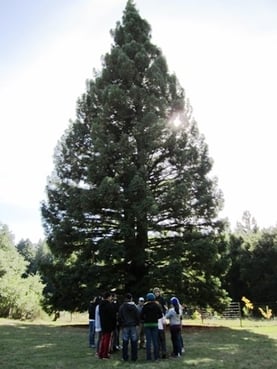

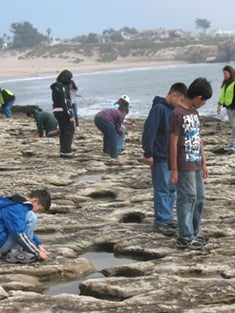

Sempervirens Activities/Curriculum
Redwood Day
During Redwood Day students learn about redwood ecology and the natural history of the redwood forest. They see redwood trees, turn over logs searching for newts and millipedes, and learn about decomposition while searching for the most famous invertebrate of the redwood forest: the banana slug.
Oak Day
On Oak Day, students get to explore the diverse ecosystems of the Oak and Madrone forest along Bean Creek, where students can search for and identify aquatic insects. They may get to search for salamanders, look for signs of animals in the sunny chaparral or do a creek study by a beautiful waterfall.
Beach Day
On Beach Day students search for sea stars, hermit crabs, and anemones in the tidepools. They also get a chance to explore the shoreline while keeping an eye out for harbor seals, sea lions, dolphins, whales, and sea otters that might be swimming by.
Content and Curriculum
On all three days, curriculum is correlated to the 5th or 6th grade science standards. Our program has a perfect format for lessons on: geology and erosion, energy flow and food chains, the water cycle, ecology, sensory awareness, photosynthesis, weather, pollination, watersheds, and Ohlone Native Americans. We ask teachers to make requests about what curriculum they would like us to focus on with their students.
Meals
All meals are eaten family style with students passing serving bowls around the table. All meals are nutritious, kid-friendly and well balanced, and we have the ability to accommodate a wide range of dietary needs. While in the dining hall, students learn about which foods can be composted and weigh their food after each meal to cut down on food waste. Rumor has it that if the whole dining hall gets zero food waste, the outdoor school principal will dance around with the food waste bucket on his head!
Town Hall Meeting
Students debate a development issue by role playing and voting for whether or not a wind turbine farm should be built in the forest overlooking the outdoor school. While developing and presenting their arguments, students learn important critical thinking skills, and have a chance to work on public speaking and debate skills while using their power to vote.
Barnyard Boogie
Students are encouraged to be silly and dance to fun songs sung and played on electric instruments by our naturalists.
Night Hike
Students are empowered to face their fears of the dark by hiking through the forest without a flashlight. During hikes, naturalists may focus on astronomy, night vision (rods vs. cones), owl calls, nocturnal animals or storytelling.
Songs
Each night finishes with a campfire where naturalists sing songs and tell stories. Before the site day and night hike, students will sing song to introduce some of the themes of the day. Songs cover topics such as decomposition, adaptations, nocturnal animals, plant parts, the web of life, etc.
Skit Night
On Thursday night, students feel empowered when going up on stage and performing environmentally-themed skits that they have developed with their counselor’s guidance about their cabin’s endangered species name. Students work together throughout the week to practice their skit and be prepared to present it to their classmates at skit night.
Cabin leaders
Exploring New Horizons atutilizes parent chaperones or high school cabin leaders who stay in the cabins with students during the week. Classroom teachers are involved in the recruitment and selection process. Parent chaperones or high school cabin leaders will meet at your school and ride the bus to the outdoor school with the students.
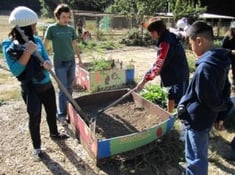

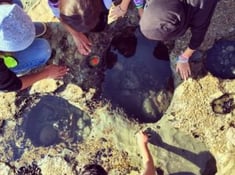

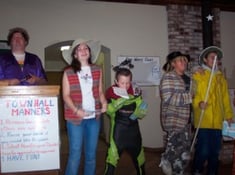

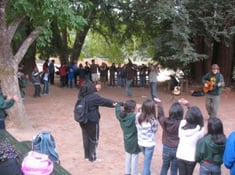

EXPLORING NEW HORIZONS OUTDOOR SCHOOLS
Inspiring, empowering, and transforming children’s lives through outdoor education.
© GreenSkillsLab, 2024.
